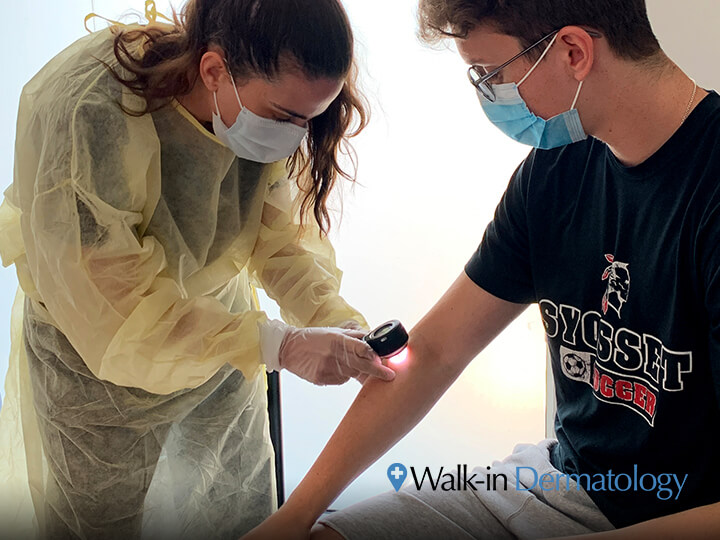Checking Out the Function of Skin Specialists in Identifying and Treating Diverse Skin Conditions With Accuracy
The field of dermatology plays a crucial role in identifying and taking care of a substantial array of skin problem that people may experience. From common concerns like acne and dermatitis to more intricate disorders such as cancer malignancy or unusual genetic skin diseases, skin doctors are at the leading edge of diagnosing and dealing with these conditions with precision. With innovations in analysis tools and tailored treatment techniques, skin specialists are increasingly able to customize interventions to individual clients' requirements - Chromaderm Melbourne. Beyond the surface area of skin problems exist interconnected elements that influence medical diagnosis and therapy outcomes. Comprehending the detailed internet of genetic, environmental, and way of living aspects that add to skin health and wellness is important for thorough care.
Importance of Very Early Discovery
Very early discovery of skin disease plays a vital duty in the reliable therapy and administration by skin specialists. Prompt identification of skin problems permits for prompt treatment, which can prevent the development of problems and reduce prospective issues. Skin specialists depend on their knowledge to acknowledge refined changes in the skin that might show underlying issues, such as skin cancer, eczema, dermatitis, or psoriasis. By conducting detailed evaluations and utilizing analysis tools like biopsies or dermoscopy, dermatologists can accurately detect a vast array of skin conditions.
Spotting skin cancer in its early phases dramatically boosts the prognosis and boosts the likelihood of effective therapy end results. Stressing the relevance of very early discovery underscores the vital function that dermatologists play in advertising skin health and wellness and health.
Advanced Diagnostic Strategies
Making use of state-of-the-art technology and specific experience, skin specialists utilize sophisticated diagnostic methods to properly identify and evaluate various skin disease. Among the key devices in the dermatologist's diagnostic arsenal is dermoscopy, a non-invasive technique that allows for the examination of skin frameworks not noticeable to the naked eye. By magnifying the skin, dermoscopy aids in the early detection of cancer malignancy, basic cell carcinoma, and other skin cancers cells. Furthermore, skin specialists may utilize confocal microscopy, a high-resolution imaging technique that enables them to imagine skin at a cellular level without the demand for a biopsy. This modern technology is specifically practical in identifying inflammatory skin problem and tracking therapy efficiency.
In addition, molecular testing has changed the medical diagnosis and treatment of skin conditions by allowing dermatologists to analyze hereditary mutations related to problems such as melanoma and hereditary dermatoses. Through methods like polymerase domino effect (PCR) and next-generation sequencing (NGS), dermatologists can give individualized treatment strategies based on an individual's particular hereditary profile. These advanced diagnostic devices enhance the precision and efficiency of dermatological treatment, ultimately bring about much better end results for patients.

Tailored Therapy Approaches
With a detailed understanding of skin disease achieved via innovative analysis strategies, skin doctors customize treatment methods to attend to individual patient requires efficiently. This individualized method is essential in ensuring optimal end results for individuals with diverse skin conditions. By taking into consideration variables such as skin type, case history, way of life habits, and therapy choices, skin specialists can establish therapy strategies that are especially tailored per individual.
Tailored treatment techniques might include a mix of treatments such as topical medicines, dental medicines, minimally intrusive procedures, or way of living adjustments. For circumstances, individuals with acne may profit from a regimen that consists of topical retinoids, oral prescription antibiotics, and in-office treatments such as chemical peels or laser therapy. On the other hand, individuals with dermatitis may call for a treatment plan concentrated on gentle skin care routines, moisturizers, topical corticosteroids, and recognizing and avoiding triggers that intensify their problem.

Managing Persistent Skin Problem
Skin doctors play an important role in creating long-lasting management approaches for chronic skin conditions, making certain reliable care and boosted lifestyle for people - Chromadermatology. Taking care of chronic skin problems needs a thorough technique that surpasses simply treating signs and symptoms. Dermatologists are educated to not just diagnose these problems precisely yet also to develop personalized therapy strategies that address the underlying causes and variables contributing to the skin disease's perseverance
In managing chronic skin conditions, skin specialists often utilize a mix of therapy methods tailored to every client's certain demands. This may consist of topical medicines, oral drugs, lifestyle adjustments, and procedural interventions such as laser treatment or photo-therapy. Regular follow-up appointments are necessary to keep an eye on the problem's progress, adjust treatment as needed, and offer continuous assistance and education and learning to people.
Moreover, dermatologists play a critical duty in encouraging patients to take an active role in managing their skin problem. By informing individuals concerning their problem, therapy choices, and preventative actions, skin doctors aid patients make informed decisions and cultivate healthy and balanced skin behaviors that add to lasting skin health and overall well-being.
Collaborative Treatment Strategies
In the holistic management of skin disease, collaborative care approaches entailing numerous health care professionals are important for enhancing person outcomes. Skin doctors typically work in multidisciplinary teams use this link to offer detailed care that deals with the varied demands of clients with skin problem. By teaming up with health care doctors, allergists, cosmetic surgeons, and various other specialists, skin doctors can make certain that individuals obtain incorporated and coordinated treatment tailored to their details condition.
Collaborative treatment methods likewise encompass person education and learning and support. Skin doctors can work very closely with registered nurses, pharmacists, and psycho therapists to enlighten people regarding their skin problem, treatment options, and precautionary steps. This interdisciplinary technique empowers clients to proactively join their next page care and make educated choices regarding their wellness.
Moreover, joint care permits for a more all natural assessment of clients, taking into consideration not only the physical signs of their skin disease but additionally the psychological and social impact it may have. By taking into consideration the broader implications of skin problem, medical care professionals can create a lot more individualized therapy plans that deal great post to read with the one-of-a-kind demands of each client. Eventually, joint care techniques play a crucial role in providing high-quality, patient-centered look after individuals with diverse skin conditions.
Final Thought
In verdict, dermatologists play an important duty in detecting and dealing with a vast array of skin disease with precision. With very early discovery and progressed diagnostic methods, they are able to provide tailored treatment strategies for optimum end results. By taking care of persistent skin problem and carrying out collaborative treatment strategies, dermatologists guarantee efficient and extensive care for their patients. Their knowledge and commitment contribute substantially to the overall health and wellness and health of individuals with diverse skin worries.
Skin specialists count on their experience to identify subtle changes in the skin that might suggest underlying problems, such as skin cancer cells, psoriasis, dermatitis, or dermatitis. By magnifying the skin, dermoscopy help in the very early detection of cancer malignancy, basal cell cancer, and various other skin cancers.With a thorough understanding of skin conditions achieved via sophisticated analysis methods, skin doctors tailor therapy approaches to attend to specific patient needs successfully. Dermatologists are trained to not only detect these problems accurately however additionally to develop individualized therapy plans that attend to the underlying elements and reasons adding to the skin problem's perseverance.
In handling chronic skin problems, skin doctors often employ a combination of therapy techniques customized to each person's details requirements.